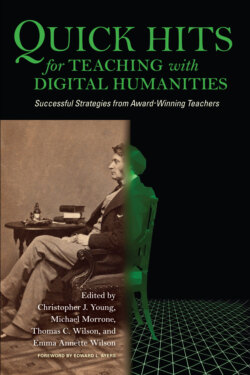Читать книгу Quick Hits for Teaching with Digital Humanities - Группа авторов - Страница 7
На сайте Литреса книга снята с продажи.
ОглавлениеDIRECTOR’S WELCOME
WELCOME TO QUICK HITS FOR TEACHING WITH DIGITAL HUMANITIES
The Quick Hits series of books began as a collection of proven teaching tips shared at FACET’s Third Annual Retreat. Twenty-eight years later FACET members continue to come together for an annual retreat to recognize, celebrate, and promote effective teaching and learning. While the retreat is a hallmark event of the FACET experience, the community of dynamic teachers dedicated to excellence in teaching and learning continuously advocates pedagogical innovation, inspires growth and reflection, cultivates the Scholarship of Teaching and Learning, and fosters personal renewal in the commitment to student learning.
FACET and its membership vigilantly attend to the present and future of pedagogy in the pursuit of student success. In that vein, Quick Hits for Teaching with Digital Humanities marks the ninth installment in the Quick Hits series: Quick Hits, More Quick Hits, Quick Hits for New Faculty, Quick Hits for Educating Citizens, Quick Hits for Service Learning, Quick Hits for Teaching with Technology, Quick Hits for Adjunct Faculty, and Quick Hits for Teaching and Learning with Canvas (available on IU Expand). Each of these volumes features techniques and strategies that have proven effective in the classroom; more recent volumes of Quick Hits have also focused on the scholarship underlying these tips and strategies. The current volume follows this trend of longer Quick Hits with thirty-six case studies. A number of them include images that add perspective on the discussed topic.
As with previous Quick Hits, dedication to pedagogical innovation and effectiveness underlies the volume’s topic, digital humanities. The articles in this book demonstrate how technological capabilities and access to rich archival resources open possibilities for pedagogical creativity and new avenues of community engagement. Personally, as I read these chapters, I feel inspired by the teachers who push the disciplines forward, who collaborate across disciplines, often with our librarian colleagues, and who empower students to make their good work visible beyond the classroom and university walls. I also feel challenged: our students have so much information at their fingertips and technological opportunity to shape the world around them, but they face a turbulent marketplace of ideas. The projects and works discussed in these essays, by and large, involve complexity, carefulness, creativity, critical thinking, and collaboration. The outcomes are often impressive signature works. The digital humanities, in other words, offer a way to prepare our students to have meaningful lives.
While this volume continues a publishing tradition for FACET, it does break new ground. For the first time a Quick Hits volume includes editors from beyond Indiana University. Emma Annette Wilson from Southern Methodist University and Thomas C. Wilson from the University of Alabama join FACET member Christopher J. Young, Professor of History and Assistant Vice Chancellor for Academic Affairs at Indiana University Northwest, and myself as editors. I appreciate deeply your contributions to this project. I also want to thank Edward Ayers from the University of Richmond for writing the volume’s foreword. Finally, I am grateful to Karissa Rector, FACET’s Program Coordinator, whose technical and organizational skills helped bring this project to completion.
Michael Morrone
University Director, Faculty Academy onExcellence in Teaching, Indiana University
